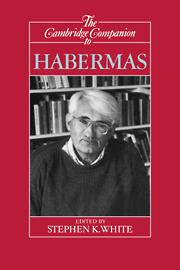1 - Reason, modernity, and democracy
from PART I - INTRODUCTION
Published online by Cambridge University Press: 28 May 2006
Summary
One of the most distinctive features on the intellectual landscape of the last decades of the twentieth century is the intensity with which doubts have been raised about the conceptual foundations of Western modernity. Hard questions have emerged about the predominant modern understandings of reason, subjectivity, nature, progress, and gender. With the exception of the last topic, one might argue that these questions emerged in this century in their most powerful form within two streams of German philosophical reflection. In the immediate post-World War II years, Martin Heidegger wrote his “Essay on Humanism” (1946) and “The Question Concerning Technology” (1949), and he continued for the next thirty years to articulate a thorough critique of most of what the modern West has held dear. In 1947 Theodor Adorno and Max Horkheimer published their Dialectic of Enlightenment, developing the claim that the systematic pursuit of enlightened reason and freedom had the ironic long-term effect of engendering new forms of irrationality and repression. These critiques had an immense impact both on the initial shape of the work of Jiirgen Habermas and on its continued evolution.
- Type
- Chapter
- Information
- The Cambridge Companion to Habermas , pp. 3 - 16Publisher: Cambridge University PressPrint publication year: 1995
- 10
- Cited by

